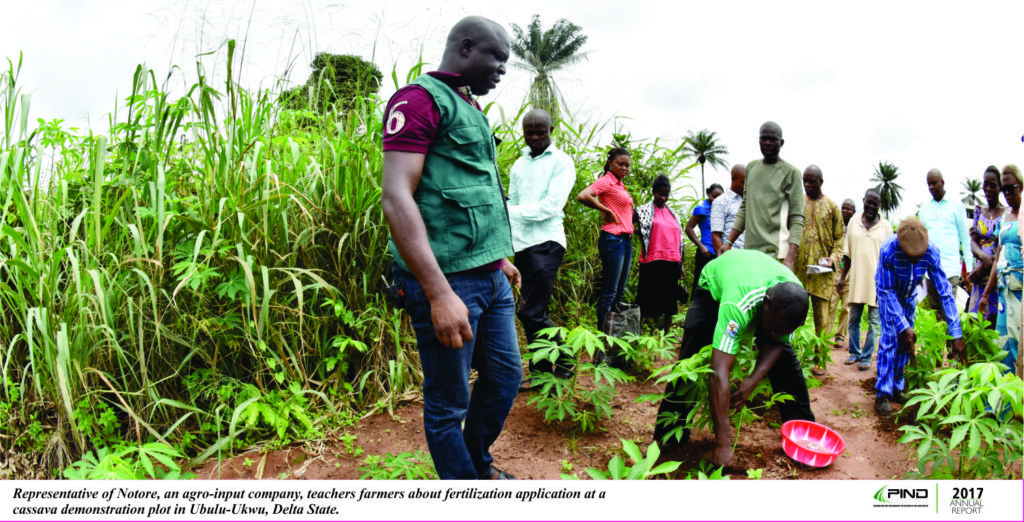
Common constraints faced by cassava farmers in the Niger Delta include lack of access to and improper use of fertilizers and other crop protective products, poor knowledge of correct weed management practices and improved high yielding stem varieties and poor agronomic practices in general. Resulting from this, smallholder farmers have average yield of 8-12 tons per hectare which falls short of the potential 25-40 tons using best practices.
Input companies that produce and distribute fertilizers, pesticides, herbicides, insecticides, animal care medicines and many others that farmers need and the agro dealers who retail these inputs need access to more markets for the products but there was no link between them and the farmers. PIND therefore established partnership with input companies to run a cassava demonstration plot project targeted at improving farmers’ agronomic practices such as land preparation, use of improved cassava stems, weed management, herbicides and fertilizer application, among others for higher productivity and at the same time promoting their products to farmers.
Based on a successful pilot in 2015 -2016, this year, five input companies (Harvest Field, Notore, Candel, Indorama and Springfield Agro) scaled up the project by setting up 20 new demonstration farms in Abia, Akwa Ibom, Delta, Edo, Imo and Ondo States. This brought our leveraged investments into the sector to over N200 million by end of 2017, up from N36 million leveraged in 2016. They trained 62 agro dealers (59 male and 3 female) on good agronomic practices, in addition to the 45 engaged during the pilot, making a cumulative total of 107 agro dealers who would continue to drive the processes required by farmers to make the model sustainable and independent of PIND.
With a view to deepening the impact of the model, the Foundation revised the scale up strategy in 2017 to incorporate business skills training using the Nigeria Agricultural Enterprise Curriculum (NAEC) together with technical skills training. We then facilitated a training of trainers (TOT) for selected input companies and agro dealers drawn from across the Niger Delta. These agro dealers are stepping down the NAEC trainings and organizing demonstrations of good agronomic practices to farmers across the States.
Following the harvest of crops planted during this period, a post-pilot survey during the second quarter of 2017 showed that benefitting farmers in Imo and Delta States, by implementing these improved practices, increased their output to 18.6 tons per hectare, a 123% increase, compared to the 8.33 tons per hectare by non-adopters.
These private sector leveraged investments trained 2, 451 cassava farmers on good agronomic practices during the year – which brings the total number trained from 2010 – 2017 to over 6,000 (1,842 females, 4,298 males)– out of which 1,389 who changed knowledge, attitude and practices generated a combined net additional income of N209,868,130 from the N25,165,096 seen in 2016. The investments further facilitated 204 new full time equivalent jobs in the sector (from 66 in 2016).
The input companies credit PIND as having triggered the right incentives for them to drive the model and continue to invest needed resources that ensure more farmers are exposed to improved practices that would guarantee better outcomes from their farming businesses.
‘’PIND and Harvestfield Industries limited have come a long way. The discussion started in 2015 and then we signed a memorandum of understanding to partner with PIND through setting up demonstrations in cassava growing areas clusters. We started with a pilot program in Ubuluku in Delta State where we worked with one cassava cluster which is called Ifedinma Cassava Group in Ubuluku, Delta State. The collaboration was with Harvestfield, PIND, and Notore fertilizer and also Root Crop Research Institute, Umudike at Umuahia. Then, Umudike provided improved varieties to be used. Notore provided the right fertilizer for the demonstration while HarvestField provided agronomic training, and weed and pest management inputs for farmers. The result was shared and it was a success. It was scaled up in 2016 to Imo State. Harvestfield also participated in Imo State and it was also a success. In 2017, it was also scaled up and Harvestfield collaborated to make this happen in Edo State and some other parts of Delta State and Imo state. With the product that we are showcasing through the cassava demonstration plots, it has helped us to sensitize and allow farmers to witness the efficacy of our products and how it works. We are still getting patronage from the areas that we have demonstrated these products. I would say it is a positive impact on our side’’ – Benjamin Eze, the National Assistant Technical Manager for HarvestField industries limited.
DOWNLOAD REPORT HERE PIND 2017 Annual Report (4223 downloads )



